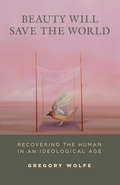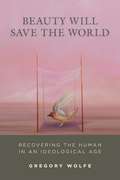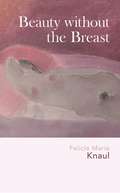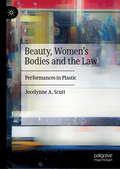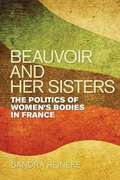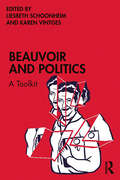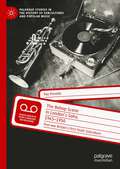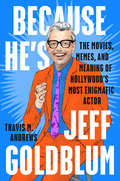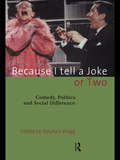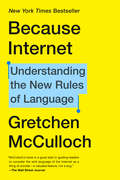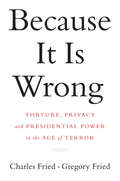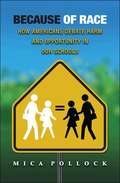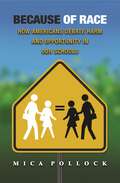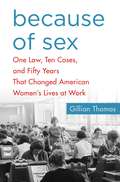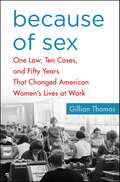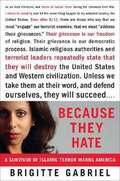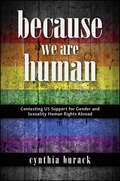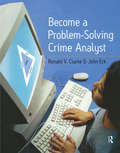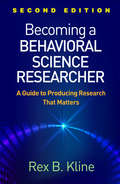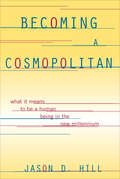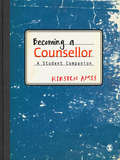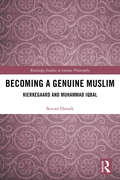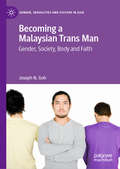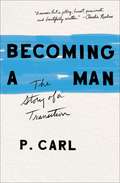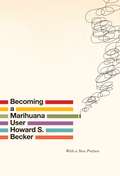- Table View
- List View
Beauty Will Save the World: Recovering the Human in an Ideological Age
by Gregory WolfeCulture, Not PoliticsWe live in a politicized time. Culture wars and increasingly partisan conflicts have reduced public discourse to shouting matches between ideologues. But rather than merely bemoaning the vulgarity and sloganeering of this era, says acclaimed author and editor Gregory Wolfe, we should seek to enrich the language of civil discourse. And the best way to do that, Wolfe believes, is to draw nourishment from the deepest sources of culture: art and religious faith.Wolfe has been called &“one of the most incisive and persuasive voices of our generation,&” and this penetrating and wide-ranging book makes a powerful case for the importance of beauty and imagination to cultural renewal. He begins by tracing his own journey from a young culture warrior bent on attacking the modern world to a career devoted to nurturing the creation of culture through contemporary literature and art that renew the Western tradition. Along the way, Wolfe finds in Renaissance Christian humanists like Erasmus and Thomas More—and their belief that imagination and the arts are needed to offset the danger of ideological abstractions— a &“distant mirror&” in which to see our own times.
Beauty Will Save World: Recovering the Human in an Ideological Age
by Gregory WolfeA writer in residence at Seattle Pacific University, Wolfe founded and edits the literature and arts journal Image. Here he shares his thoughts about how Christian humanism can improve the world. His sections cover from ideology to humanism; Christianity, literature, and modernity; six writers; three artists; and four men of letters. Among his topics are a portrait of the editor as a young man, the writer of faith in a fractured culture, Evelyn Waugh, Wendell Barry, Mary McCleary, and Malcolm Muggeridge. Annotation ©2011 Book News, Inc. , Portland, OR (booknews. com)
Beauty without the Breast
by Felicia Marie KnaulFelicia Knaul, an economist who has lived and worked for two decades in Latin America on health and social development, documents the personal and professional sides of her breast cancer experience. Beauty without the Breast contrasts her difficult but inspiring journey with that of the majority of women throughout the world who face not only the disease but stigma, discrimination, and lack of access to health care. This wrenching contrast is the cancer divide - an equity imperative in global health. Knaul exposes barriers affecting women in low and middle-income countries and highlights the role of men, family, and community in responding to the challenge of breast cancer. She shares striking data about breast cancer, a leading killer of young women in developing countries, and narrates the process of applying this evidence and launching Tómatelo a Pecho (also the book title in Spanish)- a Mexico-based program promoting awareness and access to health care. The book concludes with letters from Dr. Julio Frenk, her husband and former Minister of Health of Mexico, written while they shared the trauma of diagnosis and treatment. With force and lucidity, the book narrates the journey of patient and family as they courageously navigate disease and survivorship.
Beauty, Women's Bodies and the Law: Performances in Plastic
by Jocelynne A. ScuttWhat makes a woman’s body beautiful? Plastic surgery, cosmetic surgery and non-surgical interventions such as Botox are changing women’s bodies physically and affecting cultural notions and expectations of what it means to be a woman. Yet where does the law stand? Is the renovation of women’s bodies legal? This book explores a range of topics, including: whether shape-changing by surgical and non-surgical means is ‘really’ what women want; the question of legal intervention when operations, injections and other methods go wrong; the impact of consent determinations on whether women can or cannot freely seek changes to their body structure; and the role which culture and social expectations play in women’s decision-making. Taking a legal perspective on the vast range of ‘beauty’ interventions available to women, Scutt discusses women’s perceptions of body and beauty, pressures on women to conform to ‘idealised’ notions of the perfect woman’s body, and outcomes of legal actions including those taken by individual women who are unhappy with results, as well as those launched against companies trading in products advertised as safe and for women’s benefit. Beauty, Women’s Bodies and the Law will appeal to readers with an interest in women’s and gender studies, law, and cultural studies.
Beauvoir and Her Sisters: The Politics of Women's Bodies in France
by Sandra ReinekeBeauvoir and Her Sisters investigates how women's experiences, as represented in print culture, led to a political identity of an "imagined sisterhood" through which political activism developed and thrived in postwar France. Through the lens of women's political and popular writings, Sandra Reineke presents a unique interpretation of feminist and intellectual discourse on citizenship, identity, and reproductive rights. Drawing on feminist writings by Simone de Beauvoir, feminist reviews from the women's liberation movement, and cultural reproductions from French women's fashion and beauty magazines, Reineke illustrates how print media created new spaces for political and social ideas. This sustained study extends from 1944, when women received the right to vote in France, to 1993, when the French government outlawed anti-abortion activities. Touching on the relationship between consumer culture and feminist practice, Reineke's analysis of a selection of women's writings underlines how these texts challenged traditional gender models and ideals. In revealing that women collectively used texts to challenge the state to redress its abortion laws, Reineke renders the act of writing as a form of political action and highlights the act of reading as an essential but often overlooked space in which marginalized women could exercise dissent and create solidarity.
Beauvoir and Politics: A Toolkit
by Liesbeth Schoonheim Karen VintgesApproaching Simone de Beauvoir’s feminism and social commentary as a resource to understand our current crises, Beauvoir and Politics: A Toolkit brings together established and emerging scholars to apply her insights to gender studies, political philosophy, decolonisation, intellectual history, age theory, and critical phenomenology. The essays in this collection start from key concepts in Beauvoir’s oeuvre and relate them to contemporary debates, asking how her notion of ambiguity speaks to lived experiences that have been highly politicized in recent years, such as pregnancy, old age, sexual violence, and the exposure of black and brown bodies to police violence; how myths inform our notions of collective, national identities, as well as notions of masculinity and femininity; and how she provides conceptual tools that help to theorize the various political strategies that are used to challenge gendered and racialized systems of oppression. These and other issues are central to this critical appraisal of Beauvoir’s legacy, demonstrating the contemporary relevance of her thought as it diagnoses the present and looks toward change for a better future. This book will be of great interest to undergraduate and postgraduate students looking to engage with the political content of Simone de Beauvoir’s work and the timely application of her ideas.
The Bebop Scene in London's Soho, 1945-1950: Post-war Britain’s First Youth Subculture (Palgrave Studies in the History of Subcultures and Popular Music)
by Ray KinsellaThis is the first book to tell the story of the bebop subculture in London’s Soho, a subculture that emerged in 1945 and reached its pinnacle in 1950. In an exploration via the intersections of race, class and gender, it shows how bebop identities were constructed and articulated. Combining a wide range of archival research and theory, the book evocatively demonstrates how the scene evolved in Soho’s clubs, the fashion that formed around the music, drug usage amongst a contingent of the group, and the moral panic which led to the police raids on the clubs between 1947 and 1950. Thereafter it maps the changes in popular culture in Soho during the 1950s, and argues that the bebop story is an important precedent to the institutional harassment of black-related spaces and culture that continued in the twentieth and twenty-first centuries. This book therefore rewrites the first chapter of the ‘classic’ subcultural canon, and resets the subcultural clock; requiring us to rethink the periodization and social make-up of British post-war youth subcultures.
Because He's Jeff Goldblum: The Movies, Memes and Meaning of Hollywood's Most Enigmatic Actor
by Travis M. AndrewsAn irreverent yet deeply researched biography about the always offbeat, suddenly meme-able, and wildly popular actor When did you first encounter Jeff Goldblum? Maybe as a deranged killer in his 1974 screen debut in Death Wish? Maybe as a cynical journalist in 1983s The Big Chill? Or a brilliant if egotistical scientist-turned-fly in 1986s The Fly? Perhaps as the wise-cracking skeptical mathematician in 1993s Jurassic Park? Or maybe you&’re not a film buff but noticed his face as part of one of the Internet&’s earliest memes. Who knows? Whenever it was, you&’ve probably noticed that Goldblum has become one of Hollywood&’s most enduring actors, someone who only seems to grow more famous, more heralded, more beloved through the decades, even though he&’s always followed his own, strange muse. The guy primarily plays jazz music these days, but is more famous than ever. Actor, pianist, husband, father, style icon, meme. Goldblum contains multitudes, but why? What does he mean? The Washington Post&’s Travis M. Andrews decided to find out. And so he set out on a journey through Goldblum's career, talking to directors like Lawrence Kasdan and Philip Kaufman, colleagues like Harry Shearer and Billy Crudup, and pop culture experts like Chuck Klosterman and Sean Fennessey, to get to the bottom of this whole Goldblum thing. And then he took what he learned and he wrote this book, which is titled Because He&’s Jeff Goldblum and is the best thing written since The Brothers Karamazov and slightly easier to follow. But you should already know that. In this new semi-biography, semi-rumination, and semi-ridiculous look at the career of Goldblum, Andrews takes you behind the scenes of his iconic movies, explores the shifting nature of fame in the twenty-first century, and spends far too much time converting Goldblum&’s name into various forms of speech. Want to hear how Goldblum saved a script supervisor from an amorous baboon? Or what he would write on the mirror after taking showers when he was a teenager? How about his feelings on various brands of throat lozenges? (That one could be an entire book unto itself.) Then this is the book for you!
Because I Tell a Joke or Two: Comedy, Politics and Social Difference
by Stephen WaggBecause I Tell a Joke or Two explores the complex relationship between comedy and the social differences of class, region, age, gender, sexuality, ethnicity and nationhood. It shows how comedy has been used to sustain, challenge and to change power relationships in society. The contributors, who include Stephen Wagg, Mark Simpson, Stephen Small, Paul Wells and Frances Williams, offer readings of comedy genres, texts and performers in Britain, the United States and Australia. The collection also includes an interview with the comedian Jo Brand. Topics addressed include: * women in British comedies such as Butterflies and Fawlty Towers * the life and times of Viz, from Billy the Fish to the Fat Slags * queer readings of Morecambe and Wise, the male double act * the Marx brothers and Jewish comedy in the United States * black radical comedy in Britain * The Golden Girls, Cheers, Friends and American society.
Because Internet: Understanding the New Rules of Language
by Gretchen McCullochA Wired Must-Read Book of Summer <P><P>“Gretchen McCulloch is the internet’s favorite linguist, and this book is essential reading. Reading her work is like suddenly being able to see the matrix.” —Jonny Sun, author of everyone's a aliebn when ur a aliebn too <P><P>Because Internet is for anyone who's ever puzzled over how to punctuate a text message or wondered where memes come from. It's the perfect book for understanding how the internet is changing the English language, why that's a good thing, and what our online interactions reveal about who we are. Language is humanity's most spectacular open-source project, and the internet is making our language change faster and in more interesting ways than ever before. <P><P>Internet conversations are structured by the shape of our apps and platforms, from the grammar of status updates to the protocols of comments and @replies. Linguistically inventive online communities spread new slang and jargon with dizzying speed. What's more, social media is a vast laboratory of unedited, unfiltered words where we can watch language evolve in real time.Even the most absurd-looking slang has genuine patterns behind it. <P><P>Internet linguist Gretchen McCulloch explores the deep forces that shape human language and influence the way we communicate with one another. She explains how your first social internet experience influences whether you prefer "LOL" or "lol," why ~sparkly tildes~ succeeded where centuries of proposals for irony punctuation had failed, what emoji have in common with physical gestures, and how the artfully disarrayed language of animal memes like lolcats and doggo made them more likely to spread. <P><P><b> A New York Times Bestseller</b>
Because It Is Wrong: Torture, Privacy and Presidential Power in the Age of Terror
by Gregory Fried Charles FriedElevating the torture and privacy debate, this book brilliantly challenges the knee-jerk responses of those in media and government. Can torture ever be justified? When is eavesdropping acceptable? Should a kidnapper be waterboarded to reveal where his victim has been hidden? Ever since 9/11 there has been an intense debate about the government's application of torture and the pervasive use of eavesdropping and data mining in order to thwart acts of terrorism. To create this seminal statement on torture and surveillance, Charles Fried and Gregory Fried have measured current controversies against the philosophies of Aristotle, Locke, Kant, and Machiavelli, and against the historic decisions, large and small, of Jefferson, Lincoln, and Pope Sixtus V, among many others. Because It Is Wrong not only discusses the behavior and justifications of Bush government officials but also examines more broadly what should be done when high officials have broken moral and legal norms in an attempt to protect us. This is a moral and philosophical meditation on some of the most urgent issues of our time.
Because of Race: How Americans Debate Harm and Opportunity in Our Schools
by Mica PollockInBecause of Race, Mica Pollock tackles a long-standing and fraught debate over racial inequalities in America's schools. Which denials of opportunity experienced by students of color should be remedied? Pollock exposes raw, real-time arguments over what inequalities of opportunity based on race in our schools look like today--and what, if anything, various Americans should do about it. Pollock encountered these debates while working at the U. S. Department of Education's Office for Civil Rights in 1999-2001. For more than two years, she listened to hundreds of parents, advocates, educators, and federal employees talk about the educational treatment of children and youth in specific schools and districts. People debated how children were spoken to, disciplined, and ignored in both segregated and desegregated districts, and how children were afforded or denied basic resources and opportunities to learn. Pollock discusses four rebuttals that greeted demands for everyday justice for students of color inside schools and districts. She explores how debates over daily opportunity provision exposed conflicting analyses of opportunity denial and harm worth remedying. Because of Race lays bare our habits of argument and offers concrete suggestions for arguing more successfully toward equal opportunity.
Because of Race: How Americans Debate Harm and Opportunity in Our Schools
by Mica PollockIn Because of Race, Mica Pollock tackles a long-standing and fraught debate over racial inequalities in America's schools. Which denials of opportunity experienced by students of color should be remedied? Pollock exposes raw, real-time arguments over what inequalities of opportunity based on race in our schools look like today--and what, if anything, various Americans should do about it. Pollock encountered these debates while working at the U.S. Department of Education's Office for Civil Rights in 1999-2001. For more than two years, she listened to hundreds of parents, advocates, educators, and federal employees talk about the educational treatment of children and youth in specific schools and districts. People debated how children were spoken to, disciplined, and ignored in both segregated and desegregated districts, and how children were afforded or denied basic resources and opportunities to learn. Pollock discusses four rebuttals that greeted demands for everyday justice for students of color inside schools and districts. She explores how debates over daily opportunity provision exposed conflicting analyses of opportunity denial and harm worth remedying. Because of Race lays bare our habits of argument and offers concrete suggestions for arguing more successfully toward equal opportunity.
Because of Sex: One Law, Ten Cases, and Fifty Years that Changed American Women's Lives at Work
by Gillian ThomasBest known as a monumental achievement of the civil rights movement, the 1964 Civil Rights Act also revolutionized the lives of America's working women. Title VII of the law made it illegal to discriminate "because of sex. " But that simple phrase didn't mean much until ordinary women began using the law to get justice on the job--and some took their fights all the way to the Supreme Court. <P><P>Among them were Ida Phillips, denied an assembly line job because she had a preschool-age child; Kim Rawlinson, who fought to become a prison guard--a "man's job"; Mechelle Vinson, who brought a lawsuit for sexual abuse before "sexual harassment" even had a name; Ann Hopkins, denied partnership at a Big Eight accounting firm because the men in charge thought she needed "a course at charm school"; and most recently, Peggy Young, UPS truck driver, forced to take an unpaid leave while pregnant because she asked for a temporary reprieve from heavy lifting. <P><P>These unsung heroines' victories, and those of the other women profiled dismantled a "Mad Men" world where women could only hope to play supporting roles; where sexual harassment was "just the way things are"; and where pregnancy meant getting a pink slip. Through first-person accounts and vivid narrative, Because of Sex tells the story of how one law, our highest court, and a few tenacious women changed the American workplace forever.
Because of Sex: One Law, Ten Cases, and Fifty Years That Changed American Women's Lives at Work
by Gillian Thomas“Meticulously researched and rewarding to read…Thomas is a gifted storyteller.” —The New York Times Book ReviewBest known as a monumental achievement of the civil rights movement, the 1964 Civil Rights Act also revolutionized the lives of America’s working women. Title VII of the law made it illegal to discriminate “because of sex.” But that simple phrase didn’t mean much until ordinary women began using the law to get justice on the job—and some took their fights all the way to the Supreme Court. Among them were Ida Phillips, denied an assembly line job because she had a preschool-age child; Kim Rawlinson, who fought to become a prison guard—a “man’s job”; Mechelle Vinson, who brought a lawsuit for sexual abuse before “sexual harassment” even had a name; Ann Hopkins, denied partnership at a Big Eight accounting firm because the men in charge thought she needed "a course at charm school”; and most recently, Peggy Young, UPS truck driver, forced to take an unpaid leave while pregnant because she asked for a temporary reprieve from heavy lifting. These unsung heroines’ victories, and those of the other women profiled in Gillian Thomas' Because of Sex, dismantled a “Mad Men” world where women could only hope to play supporting roles; where sexual harassment was “just the way things are”; and where pregnancy meant getting a pink slip.Through first-person accounts and vivid narrative, Because of Sex tells the story of how one law, our highest court, and a few tenacious women changed the American workplace forever.
Because We Are Human: Contesting US Support for Gender and Sexuality Human Rights Abroad (SUNY series in Queer Politics and Cultures)
by Cynthia BurackFinalist for the 2018 Foreword INDIES Book of the Year Award in the LGBT categoryAround the world, lesbian, gay, bisexual, transgender, and queer people continue to be threatened, attacked, arrested, tortured, and sometimes executed just for being sexual or gender minorities. Since the final months of the Clinton administration, agencies and officials of the US government have been engaging in programs and projects whose stated purposes are to serve goals of justice and equity for LGBTQ people outside the United States. Because We Are Human gives readers an inside look at US sexual orientation and gender identity (SOGI) human rights assistance programs. Cynthia Burack explores settings where indigenous and transnational human rights advocates meet to fund and strategize SOGI human rights movements. This book also examines key arguments against these programs, policies, and interventions that originate on both the conservative right and the progressive academic left. Burack ultimately recommends support for a US commitment to SOGI human rights and programs that serve the needs of LGBTQ people.
Become a Problem-Solving Crime Analyst
by Ronald Clarke John E. EckCrime analysis has become an increasingly important part of policing and crime prevention, and thousands of specialist crime analysts are now employed by police forces worldwide. This is the first book to set out the principles and practice of crime analysis, and is designed to be used both by crime analysts themselves, by those responsible for the training of crime analysts and teaching its principles, and those teaching this subject as part of broader policing and criminal justice courses. The particular focus of this book is on the adoption of a problem solving approach, showing how crime analysis can be used and developed to support a problem oriented policing approach – based on the idea that the police should concentrate on identifying patterns of crime and anticipating crimes rather than just reacting to crimes once they have been committed. In his foreword to this book, Nick Ross, presenter of BBC Crime Watch, argues passionately that crime analysts are 'the new face of policing', and have a crucial part to play in the increasingly sophisticated police response to crime and its approach to crime prevention – 'You are the brains, the expert, the specialist, the boffin.'
Becoming a Behavioral Science Researcher, Second Edition: A Guide to Producing Research That Matters
by Rex B. KlineAcclaimed for helping novice behavioral scientists hit the ground running as producers of meaningful research, this text now has been extensively revised with 55% new material, including current guidance on open science; transparency; replication; and quantitative, qualitative, and mixed methods reporting standards. The book provides the conceptual knowledge and practical skills needed to bridge the gap between introductory research design and analysis courses and execution of an independent study. In a candid, conversational style, Rex B. Kline guides the reader to choose appropriate research designs and analysis options; avoid common fallacies in interpreting the outcomes of statistical tests; make informed measurement choices; screen data for problems that could yield inaccurate results; and craft effective theses, journal articles, and presentations. Revised pedagogical features include engaging examples from published studies and student theses, as well as end-of-chapter exercises with answers. New to This Edition *Addresses critical "research crises" that have come to the fore in the last decade--and ways to remedy them. *New chapters on the replication crisis, reporting standards, the open-science movement, and statistics reform. *Extensively revised chapters on effect size estimation and psychometrics. *Updated discussions of how to write publishable journal articles and create effective presentations.
Becoming a Cosmopolitan: What It Means to Be a Human Being in the New Millennium
by Jason D HillThe philosopher and author of Beyond Blood Identities offers a new paradigm of persona freedom and moral self-possession. As a Jamaican immigrant arriving in the United States at the age of twenty, Jason Hill noticed how often Americans identified themselves in terms of race and ethnicity. He observed, for example, the reluctance of West Indians to joins 'black causes' for fear of losing their identity. He began to ask himself what sort of world he wanted to live in, a quest that in time led him to the idea of the cosmopolitan. In Becoming a Cosmopolitan, Jason D. Hill argues that we need a new understanding of the self. He revives the idea of the cosmopolitan, the person who identifies the world as home. Arguing for the right to forget where we came from, Hill proposes a new moral cosmopolitanism for the new millennium.
Becoming a Counsellor: A Student Companion
by Ms Kirsten AmisBecoming a Counsellor is a one-stop reference book for all new counselling trainees. Whether starting out on an introductory course or tackling a postgraduate diploma, this book will make the journey to professional qualification that little bit easier. It addresses the complexities and challenges of counselling training by confronting and unpicking the many potentially daunting issues and questions faced by students throughout their training. The book covers a comprehensive range of topics, including - choosing a course and theoretical orientation - clarifying roles - who's who on the course? - explaining common pedagogical activities and expectations, including the personal development journal - assessment, supervision and support - ethical and legal issues. While earlier chapters introduce methods of learning and developing for those new to the field, later sections addressing research, supervision and placements will be of interest to students who are studying at a higher level. This engaging, straightforward introduction to counselling will be an essential companion for students new to counselling throughout their training, whether on basic introductory or postgraduate diploma courses.
Becoming a Genuine Muslim: Kierkegaard and Muhammad Iqbal (Routledge Studies in Islamic Philosophy)
by Sevcan OzturkDespite the apparent lack of any cultural and religious connection between Kierkegaard and Iqbal, their philosophical and religious concerns and their methods of dealing with these concerns show certain parallels. This book provides a Kierkegaardian reading of Muhammad Iqbal’s idea of becoming a genuine Muslim. It reflects on the parallels between the philosophical approaches of Kierkegaard and Iqbal, and argues that, though there are certain parallels between their approaches, there is a significant difference between their philosophical stances. Kierkegaard was concerned with developing an existential dialectics; Iqbal, however, focused mostly on the identification of the problems of the modern Muslim world. As a result, Iqbal’s idea of becoming a genuine Muslim – the practical aspect of his thought and one of the most central issues of his philosophy – seems to be unclear and even contradictory at points. This book therefore uses the parallels between the two philosophers' endeavours and the notions developed by Kierkegaard to provide a strong hermeneutical tool for clarifying where the significance of Iqbal’s idea of becoming a Muslim lies. By bringing together two philosophers from different cultural, traditional and religious backgrounds, this book will appeal to students and scholars of Comparative Politics, Contemporary Islamic Philosophy and the Philosophy of Religion.
Becoming a Malaysian Trans Man: Gender, Society, Body and Faith (Gender, Sexualities and Culture in Asia)
by Joseph N. GohThis book explores the fluid, mutable and contingent ways in which transgender men in Malaysia construct their subjectivities. Against the dearth of academic resources on Malaysian trans men, this ground-breaking monograph is rooted in the lived experiences of Malaysian trans men whose vicissitudes have mostly been hidden, silenced and overlooked. Comprising diverse age groups, ethnicities, socio-economic status, educational backgrounds and religious persuasions, these trans men reveal how they navigate life in a country with secular and religious laws that criminalise their embodiments, and the strategies they deploy to achieve self-determination and self-actualisation despite being perceived as aberrant and sinful. This book demonstrates how negotiations with constitutive elements such as gender identity, social interaction, citizenship, legality, bodily struggle, medical transitioning and personal spiritual validation condition the becomings of Malaysian trans men.
Becoming a Man: The Story of a Transition
by P. CarlA &“scrupulously honest&” (O, The Oprah Magazine) debut memoir that explores one man&’s gender transition amid a pivotal political moment in America.Becoming a Man is a &“moving narrative [that] illuminates the joy, courage, necessity, and risk-taking of gender transition&” (Kirkus Reviews). For fifty years P. Carl lived as a girl and then as a queer woman, building a career, a life, and a loving marriage, yet still waiting to realize himself in full. As Carl embarks on his gender transition, he takes us inside the complex shifts and questions that arise throughout—the alternating moments of arrival and estrangement. He writes intimately about how transitioning reconfigures both his own inner experience and his closest bonds—his twenty-year relationship with his wife, Lynette; his already tumultuous relationships with his parents; and seemingly solid friendships that are subtly altered, often painfully and wordlessly. Carl &“has written a poignant and candid self-appraisal of life as a &‘work-of-progress&’&” (Booklist) and blends the remarkable story of his own personal journey with incisive cultural commentary, writing beautifully about gender, power, and inequality in America. His transition occurs amid the rise of the Trump administration and the #MeToo movement—a transition point in America&’s own story, when transphobia and toxic masculinity are under fire even as they thrive in the highest halls of power. Carl&’s quest to become himself and to reckon with his masculinity mirrors, in many ways, the challenge before the country as a whole, to imagine a society where every member can have a vibrant, livable life. Here, through this brave and deeply personal work, Carl brings an unparalleled new voice to this conversation.
Becoming a Marihuana User
by Howard S. BeckerOG Kush. Sour Diesel. Wax, shatter, and vapes. Marijuana has come a long way since its seedy days in the back parking lots of our culture. So has Howard S. Becker, the eminent sociologist, jazz musician, expert on “deviant” culture, and founding NORML board member. When he published Becoming a Marihuana User more than sixty years ago, hardly anyone paid attention—because few people smoked pot. Decades of Cheech and Chong films, Grateful Dead shows, and Cannabis Cups later, and it’s clear—marijuana isn’t just an established commodity, it’s an entire culture. And that’s just the thing—Becker totally called it: pot has everything to do with culture. It’s not a blight on culture, but a culture itself—in fact, you’ll see in this book the first use of the term “users,” rather than “abusers” or “addicts.” Come along on this short little study—now a famous timestamp in weed studies—and you will be astonished at how relevant it is to us today. Becker doesn’t judge, but neither does he holler for legalization, tell you how to grow it in a hollowed-out dresser, or anything else like that for which there are plenty of other books you can buy. Instead, he looks at marijuana with a clear sociological lens—as a substance that some people enjoy, and that some others have decided none of us should. From there he asks: so how do people decide to get high, and what kind of experience do they have as a result of being part of the marijuana world? What he discovers will bother some, especially those who proselytize the irrefutably stunning effects of the latest strain: chemistry isn’t everything—the important thing about pot is how we interact with it. We learn to be high. We learn to like it. And from there, we teach others, passing the pipe in a circle that begins to resemble a bona fide community, defined by shared norms, values, and definitions just like any other community. All throughout this book, you’ll see the intimate moments when this transformation takes place. You’ll see people doing it for the first time and those with considerable experience. You’ll see the early signs of the truths that have come to define the marijuana experience: that you probably won’t get high at first, that you have to hold the hit in, and that there are other people here who are going to smoke that, too.
